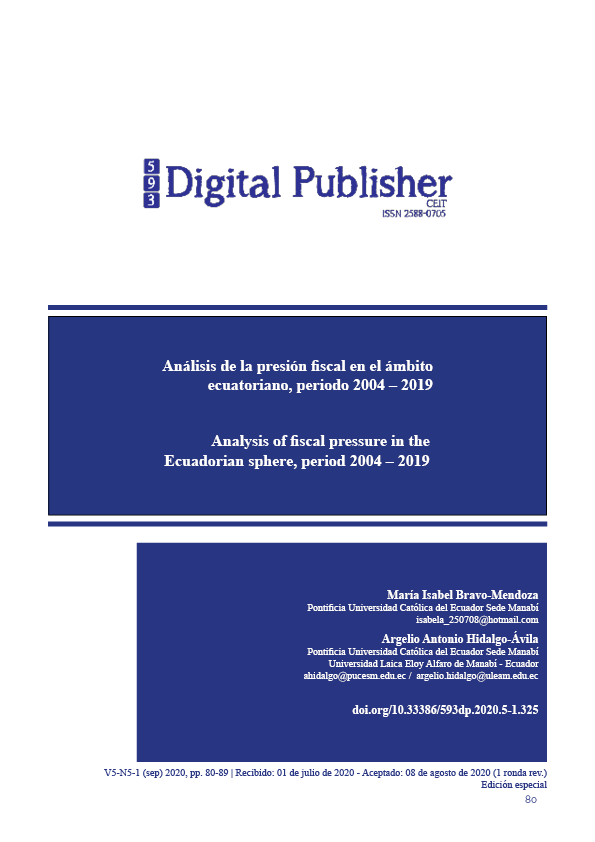Analysis of fiscal pressure in the Ecuadorian sphere, period 2004 – 2019
Main Article Content
Abstract
Fiscal pressure is an important indicator in the analysis of economic policy in countries and regions. The objective of this research was to analyze the behavior and evolution of the fiscal pressure in Ecuador and its relationship with collections and the inequality index, which allows awareness and the implementation of government and business strategies for the sake of well-being. of society as a whole. The research carried out is quantitative, descriptive, cross-sectional and non-experimental, taking the period 2004 - 2019 as observation points. The methods used to obtain and analyze the data were inductive, deductive and historical, which allowed obtaining the information and conducting your analyzes. The main results obtained show that, in Ecuador, fiscal policy shows a positive situation in the study period, however, when studying the inequality index, considering the Gini coefficient, no great variation is observed, considering that in In the 2019 period, these indicators begin to have a contrary sense to their trend, a situation that is expected to worsen in 2020, with the intense health crisis of COVID 19, which makes governments have to launch strategies to stop the situation. and promote the economic and social development of the country.
Downloads
Article Details
1. Derechos de autor
Las obras que se publican en 593 Digital Publisher CEIT están sujetas a los siguientes términos:
1.1. 593 Digital Publisher CEIT, conserva los derechos patrimoniales (copyright) de las obras publicadas, favorece y permite la reutilización de las mismas bajo la licencia Licencia Creative Commons 4.0 de Reconocimiento-NoComercial-CompartirIgual 4.0, por lo cual se pueden copiar, usar, difundir, transmitir y exponer públicamente, siempre que:
1.1.a. Se cite la autoría y fuente original de su publicación (revista, editorial, URL).
1.1.b. No se usen para fines comerciales u onerosos.
1.1.c. Se mencione la existencia y especificaciones de esta licencia de uso.
References
Boscá, J., Doménech, R., & Ferri, J. (2017). Estructura fiscal, crecimiento económico y bienestar en España. Papeles de Economía Española, 25. Obtenido de Recuperado de: https://www.uv.es/fferri/Nueva_carpeta/Research/BDFe_Laffer_PEE_15sep2017.pdf
CEPAL. (2019). Panorama Fiscal de América Latina y el Caribe, 2019. (LC/PUB.2019/8-P), Santiago. Obtenido de Recuperado de: https://repositorio.cepal.org/bitstream/handle/11362/44516/1/S1900075_es.pdf
CEPAL. (2020). Panorama Fiscal de América Latina y el Caribe, 2020: La política fiscal ante la crisis derivada de la pandemia de la enfermedad por coronavirus (COVID-19). Obtenido de https://repositorio.cepal.org//handle/11362/45730
CEPAL, & OIT. (2020). Coyuntura Laboral en América Latina y el Caribe. El trabajo en tiempos de pandemia: desafíos frente a la enfermedad por coronavirus (COVID-19). Obtenido de Recuperado de: https://repositorio.cepal.org//bitstream/11362/45557/4/S2000307_es.pdf
Clavellina , J., Del Río, J., Domínguez, M., & Herrera, V. (2019). Alternativas para reducir la evasión y elusión de impuestos de las Empresas “Factureras” o “Fantasmas”. Instituto Belisario Domínguez, Senado de la República(60). Obtenido de Recuperado de: http://www.ibd.senado.gob.mx/
Durán Cabré, J. M., & Salvadori, L. (2018). Análisis económico de la Administración Tributaria. Papeles de Economía Española, 154(Febrer), 112-130. Obtenido de http://diposit.ub.edu/dspace/bitstream/2445/120542/1/677819.pdf
León, M. O. (2015). Elusión o evasión fiscal. Revista Iberoamericana para la Investigación y el Desarrollo Educativo, 2. Obtenido de http://1-11.ride.org.mx/index.php/RIDESECUNDARIO/article/download/803/784
Martinón, R. (2017). Fraude fiscal. EUNOMÍA. Revista en Cultura de la Legalidad, 170-175. Obtenido de Recuperado de: https://ojs2017.uc3m.es/index.php/EUNOM/article/download/2081/1014
MINTEL. (2018). Plan Nacional de Gobierno Electrónico 2018-2021. Ministerio de Telecomunicaciones y de la Sociedad de la Información. Obtenido de https://www.gobiernoelectronico.gob.ec/plan-nacional-de-gobierno-electronico/
Ocampo, H. (2017). La presión fiscal en América Latina: una descripción de sus componentes y factores. Centro de estudios fiscales, 1–15. Obtenido de Recuperado de: https://cef.sri.gob.ec/pluginfile.php/32891/mod_page/content/88/NR_1745.pdf
Rojas, A., & Morán, D. (2019). La Presión Fiscal Equivalente en América Latina y el Caribe. Inter-American Development Bank. Obtenido de https://doi.org/10.18235/0001932
SRI. (2020). Informe de Labores de Gestión Institucional. ENERO A DICIEMBRE 2019. Servicio de Rentas Internas del Ecuador. Obtenido de https://www.sri.gob.ec/DocumentosAlfrescoPortlet/descargar/5830b1fb-eb5f-40ee-b191-49dd0f4b908a/Informe%20de%20gesti%c3%b3n%20institucional%202019.pdf
Suárez, E., & Castro, C. (2018). La presión fiscal del Ecuador: un enfoque comparativo con Latinoamérica. Periodo 2004–2015. Espirales revista multidisciplinaria de investigación, 2(16). Obtenido de Recuperado de: revistaespirales.com/index.php/es/article/viewFile/244/191



